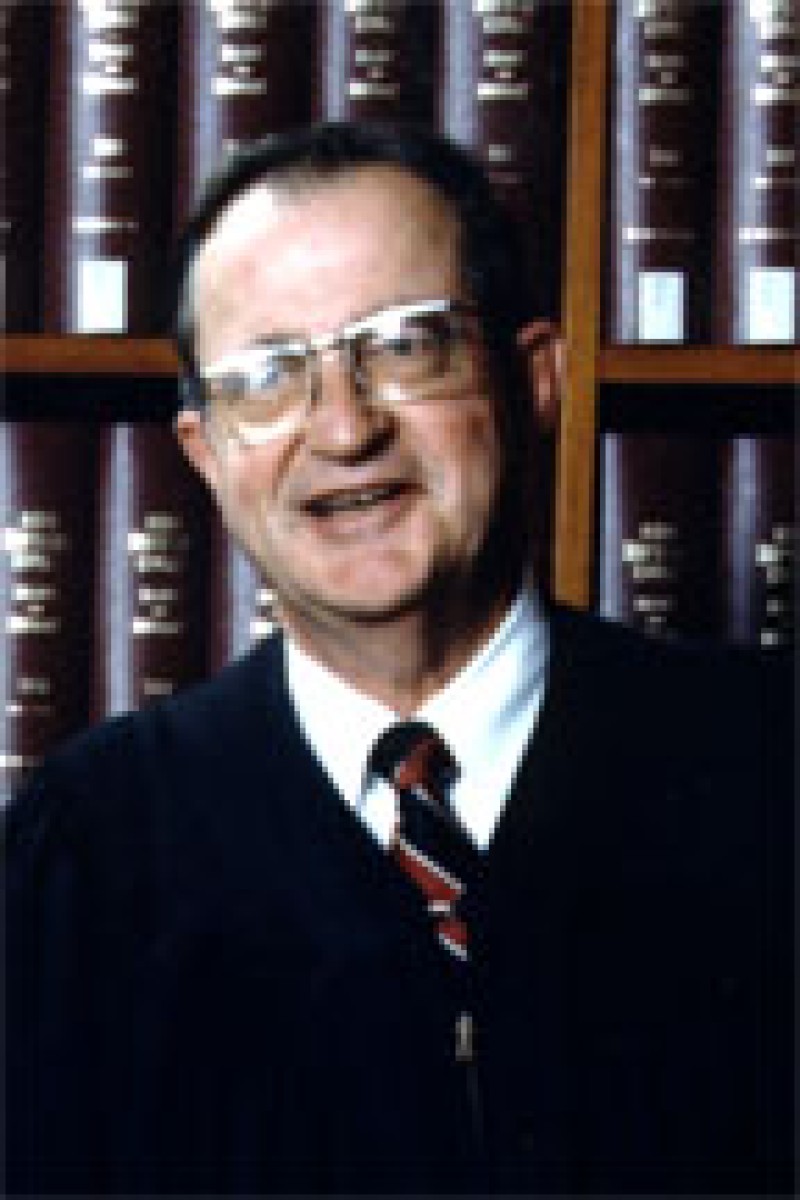J. Craig Wright
J. Craig Wright began his 12-year tenure on the Supreme Court of Ohio following his defeat of incumbent Supreme Court Justice James Celebrezze in November 1984. He brought to the Court a wealth of experience from his service as the City of Whitehall’s safety director, work in private law practice, tenure as a judge on the Franklin County Court of Common Pleas and service on the Ohio Recovery Council. He also brought a personal style and temperament to the Court that accentuated judicial and political conflicts.
Wright is the son of Harry Jr. and Marjorie Riddle Wright and was born in Chillicothe on June 21, 1929. He received a bachelor’s degree from the University of Kentucky in 1951 and graduated from Yale Law School in 1954. From 1955 through 1956, he served as a special agent in the U.S. Army Counter Intelligence Corps. Upon completion of his military service, he entered private practice with the law firm of Wright, Gilbert and Jones in Columbus. During these years, Wright also served as Whitehall’s safety director.
Wright began his judicial career with election to the Franklin County Court of Common Pleas in November 1970. During his 14-year tenure on the common pleas court, Judge Wright held the posts of administrative judge and presiding judge. While serving on the common pleas court bench, Wright was appointed to the Governor’s Ohio Recovery Council, a position he held from 1983 to 1990.
Wright was elected to the Supreme Court of Ohio in November 1984 and re-elected in 1990. He resigned from the Supreme Court in February 1996 and was replaced by Gov. George Voinovich’s appointee, Evelyn Lundberg Stratton.
During Wright’s two terms on the Supreme Court, he was part of an emerging conservative majority that attempted to move the Supreme Court away from Chief Justice Frank Celebrezze’s activist Court and toward a more traditional court. This majority relied on precedent and based the Court’s interpretations of Ohio laws on the actions and intent of the Ohio General Assembly, rather than the judicial philosophy of individual Justices. Wright also brought to the Court a strong belief in capital punishment. He rethought his position, however, once faced with the continuing need to review appeals of death penalty cases.
Wright’s dissent from the Supreme Court’s majority opinion in the case of the State of Ohio v. Berry (1995) vigorously asserted the opinion that he could not sanction the death penalty sentence for Wilford Berry, as he appeared to be mentally ill.
Berry was convicted of murder and received a death penalty sentence from the Cuyahoga County Court of Common Pleas for the murder of his employer, Charles J. Mitroff Jr. At Berry’s trial, it was determined by the common pleas court that he fit the definition of sane and competent to stand trial. During the penalty phase of the trial, Berry’s attorney introduced testimony from Berry’s mother and sister as to his impaired mental state and intelligence. The trial court, the 8th District Court of Appeals and the Supreme Court found the testimony did not show that Berry was insane or incompetent. Justice Wright strongly disagreed. Wilford Berry became the first Ohioan to be executed since 1963.
Wright’s work on the Supreme Court was not limited to hearing cases. While on the Court, he served on the Committee to Study the Impact of Drug Abuse on the Courts. He also served on the American Bar Association’s Committee to Reexamine the Death Penalty and the Ohio Bar Association’s Committee on Impaired Lawyers. Following his retirement from the Court, Justice Wright returned to private practice. Gov. Voinovich appointed Wright to serve on the Ohio Public Defenders Commission in 1997, where he served one term.
In March 2004, Wright observed 50 years of legal service in Ohio and retired from practice. Wright married the former Jane LaFollette and had two daughters, Marjorie Jane and Alice Ann.
He died on Feb. 3, 2010 in Palm Springs, California. Burial was in Forest Lawn Cemetery in Columbus on Feb. 13, 2010.

b. June 21, 1929
d. Feb. 3, 2010
140th Justice of the Supreme Court of Ohio
TERM
Jan 2, 1985
to Mar 6, 1996
